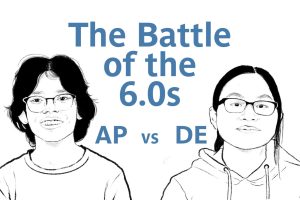Dual Enrollment
Dual enrollment offers flexibility and a real taste of college classes, making the transition to college all that easier
March 16, 2023
At 16 years old, I started taking classes at the University of Florida.
I was given this opportunity by participating in dual enrollment. In the Fall Term, I was given two free periods to take Earth Science and Fundamentals of Speech Communication. I could’ve chosen AP classes for those slots since they provide comparable rigor and HPA increase, but there is a distinct advantage to dual enrollment classes that triumphs any AP option: dual enrollment gives more opportunities to take a wider variety of courses while also having greater flexibility.
Dual enrollment is a program where high school students can take courses at certain colleges and universities. On campus, we have three schools we can enroll with: PBSC, UF, and FAU.
What makes dual enrollment more beneficial lies in the unstable nature of AP classes and their credits: the restrictive options, curriculum, class selection process, and credit transfer.
Despite having 38 official AP classes, only 25 are available for us at school, and this is further limited by our specific art areas and potential prerequisites.
I can’t easily take AP Music Theory as a communications student — even if I’m interested in expanding my musical knowledge — but I can take Music Theory 1 at PBSC, where there are over 100 classes offered for dual enrollment in both online and in-person formats, and, unlike most AP classes, are only a semester long.
These term lengths also help in giving more room to explore subjects you may not be able to in high school and especially through AP. Rather than taking a 1 credit math class for the full year, a student can take College Algebra in the fall then have fun exploring political science in the Spring Term.
Ever worried about what RateMyProfessor says about your teacher? No problem; typically, multiple instructors are offered for the same class in college.
Dual enrollment also grants the chance to choose a schedule best for you. Although all courses are online at UF, deciding when I view lessons and complete materials is up to my discretion. The same freedom cannot be said for AP classes.
While satisfying diploma credits through dual enrollment, you also can knock out General Education classes required in your first two years of college.These can later go towards your undergraduate degree, helping you complete it sooner and practically for free as dual enrollment classes are paid for by the county.
You also get a better opportunity to meet requirements to transfer dual enrollment credits. Not only is there no guarantee an institution will take an AP credit, you may have less of a chance of doing so since Universities such as UF often require an exam score of 4 or 5 to transfer AP credits for college credits or placing caps on the number of credits that are transferable.
Though there’s no denying that colleges also find ways to restrict dual enrollment credits, an exam score can’t solely stop a credit from transferring. For a stronger likelihood of transferring credit from a dual enrollment class, one would need to simply pass — receiving a minimum grade of C.
There may not even be a final exam required either. A course could have a professor who chooses to drop the final exam grade or may not require one at all. Instead of sitting in a gym answering multiple choice questions and/or constructing written responses for over an hour, all I needed to do for my last assignment in UF General Psychology class was turn in a typed paper analyzing research on any psychology subject I liked — and it was an open note assignment with no proctor. For those who struggle taking tests or don’t want to spend a year taking a class teaching to an exam, dual enrollment is a golden opportunity.
Dual enrollment expands a student’s freedom in their class selection, schedule, and ability to transfer credits. All of this is granted by checking for emails sent to students about dual enrollment registration and an appointment with a guidance counselor. Why settle for the college-level class when actual college classes are only a couple of emails away?























































